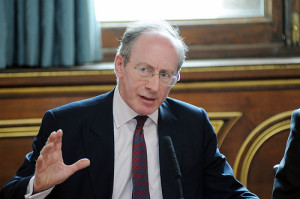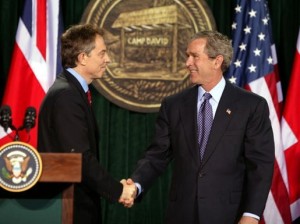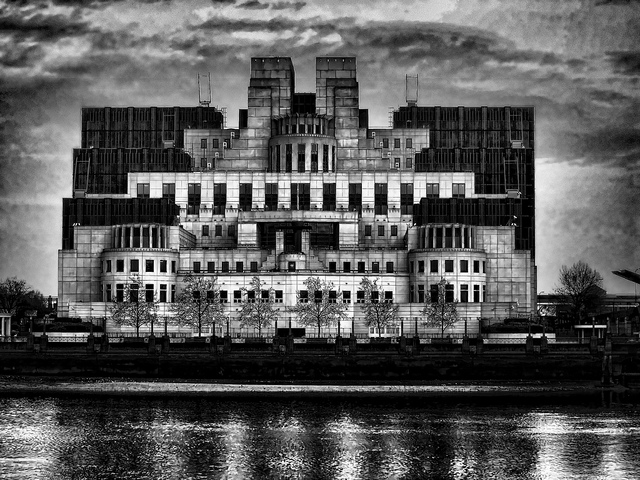Proper parliamentary oversight of the security services is desperately needed
In a recent speech, Lord Macdonald, the former Director of Public Prosecutions, was critical of the current mechanisms which oversee the British security agencies. In the speech, he recommended that the Intelligence and Security Committee become a regular Select Committee of Parliament, with the transparency and autonomy which comes alongside that status. What follows below is an excerpt of his remarks.
The key feature of democratic control is some form of parliamentary oversight. This is doubtless capable of amounting to independent scrutiny – if it works. But there is no point in creating the illusion of oversight with none of the benefits. Any committee that cannot undertake effective impartial scrutiny might easily end up becoming complicit in misconduct. Arguably, that is precisely what happened to our old Intelligence and Security Committee (ISC) before the Justice and Security Act 2013 (J&S Act).
So democratic oversight has to focus on two key areas; firstly, it should make the intelligence agencies more accountable; and secondly, it must regulate the covert relationship between the agencies and the executive to prevent abuse. The importance of the second is not to be underestimated. It is worth remembering that transparent and accountable processes protect the security services too, enhancing their independence. But, how do we best ensure effective democratic accountability through parliamentary oversight? How do we provide democratic control of executive agencies whose operations must, in order to achieve their objectives, remain secret?
This may partly be a question of form. The international norm is for oversight by way of a specialized parliamentary body but success will always depend on the mandate and the powers granted to that body. For example: who should be on the committee? How can the committee’s impartiality be guaranteed? Who has control over appointments? Who does the committee report back to? How much secret information does it have access to? Can it control its own publications? Can it compel evidence? Can it hear from external witnesses? Does it do any of its work in public?
The Intelligence and Security Committee
In the UK, our parliamentary oversight has traditionally come in the form of a statutory committee, the Intelligence and Security Committee, established by the Intelligence Services Act in 1994. Traditionally, the ISC was not a parliamentary committee as such but, in an oft-quoted phrase, ‘a committee of parliamentarians’. It is not clear what the intention of this distinction can have been if it was not the exercise of some form of extra-parliamentary control of this body. And I suppose that this extra-parliamentary control can only, in the end, have been exercisable at the behest of the executive.
And while the ISC shared some of the characteristics of a select committee and its mandate, to examine the ‘administration, policy and expenditure’ of the intelligence and security services, was designed to reflect the remit of a traditional select committee, it was very far from ever being one.
Select committees are appointed by the Houses of Parliament and report back to them. They sit in Parliament with control over their own agenda, within the terms of their mandate. They can call witnesses, produce reports and are supported by independent, parliamentary staff. Select Committees are intended, partially, to redress the balance between Parliament and the executive by allowing backbenchers from all parties to scrutinise an area of Government policy and inform Parliament of their findings.
Their impartiality is seen as absolutely key to their functions. This is important because they frequently conduct detailed investigations, taking evidence from a variety of sources including experts and other concerned individuals and their conclusions need to be credible. Indeed, Select Committees produce well-researched reports that really do have significant impact on the policy and practice of government. They also allow parliamentarians to gain an expertise which would otherwise be impossible from routine parliamentary debate- and they can go on to share this knowledge with the House as a whole.

Sir Malcolm Rifkind MP, Chair of the ISC. (FCO, CC BY-ND 2.0)
In comparison, until the passage of the Justice and Security Act 2013, the ISC was appointed by, and reported to, the Prime Minister. Until very recently, it met within the Cabinet Office and was staffed by Cabinet Office officials rather than by parliamentary clerks.
It comprised nine parliamentarians drawn from both the House of Commons and House of Lords. The ISC published Annual Reports and occasional Special Reports such as the report on the London terrorist attacks of 7 July 2005. The it was the Prime Minister who always determined when the publication of a report should take place, which obviously permitted the PM, should he so wish, to dampen its impact by delaying release for political reasons. Indeed, members of the ISC often complained about unnecessary delays in the release of their findings, so there are good grounds to suspect that this is exactly what happened.
The access that the committee had to the agencies was governed to a great degree by the trust between the committee members and the Agency in question.This was obviously an insufficient mechanism in a scrutineer, and the result was that Chairs of the committee tended to be trusted former Ministers with security experience from the Home Office, the Foreign Office or Ministry of Defence.
In other words, politicians who, as ministers, had enjoyed responsibility for the very agencies in respect of which the ISC was supposed to provide oversight. This looked, and looks, very cosy.
Criticism of the ISC
There were, during its pre-J&S Act lifetime, a number of criticisms that were made of the ISC. When he was considering the use of intelligence in the run up to the Iraq war, Lord Butler said: ‘limitations of intelligence’ are “best offset by ensuring that the ultimate users of intelligence, the decision-makers at all levels, properly understand its strengths and limitations and have the opportunity to acquire experience in handling it”. But the ISC’s reports were persistently criticised for offering information on priorities but not educating the reader about the nature of intelligence. It was said that “ISC reports read more like those from management consultants than parliamentary critics”.
The more serious criticism was that the committee ‘sees itself more as part of the Whitehall machine for the management of the security intelligence community rather than its overseer’. Another academic noted that in the ISC’s work “major issues are sometimes identified… but they are rarely addressed or explored in any depth”. For example, in its report on intelligence on Iraqi WMD, the ISC was critical of the Government’s presentation of the intelligence but it failed to recommend how intelligence material should be placed in the public domain in future. And this was despite acknowledging that the Government’s need to brief the public using intelligence information was almost certainly likely to increase.
Additionally, although the ISC conducted a number of reviews into Extraordinary Rendition, it is clear that it was at all equipped to obtain the right answers. According to a leading NGO,
“it is embarrassing that the ISC’s Rendition report was riddled with errors, and shameful that intelligence personnel were happy to play along with those errors until the High Court forced them to admit the truth.”
And finally the old ISC could actually be seen as an obstacle to accountability in the sense that it prevented potentially more effective scrutiny by other committees. It certainly resisted cooperation with them.
Successive Secretaries of State refused to allow other Select Committees, such as the Foreign Affairs Committee, to have access to the intelligence agencies, on the grounds that parliamentary scrutiny was conducted by the ISC. The frustration caused by this increased as intelligence work encroached more clearly on the domain of other committees. Some Select Committees emphasised that this denial of access prevented them from doing their job.
The Joint Committee on Human Rights said in 2006
“we have no desire to obtain access to State secrets, but we do consider it to be a matter of some importance that the head of the security services be prepared to answer questions from the parliamentary committee with responsibility for human rights.”
They continued
“There is an increasingly urgent need to devise new mechanisms of independent accountability and oversight of both the security and intelligence agencies and the Government’s claims based on intelligence information. In addition to more direct parliamentary accountability, the Committee considers that in principle the idea of an “arms length” monitoring body charged with oversight of the security and intelligence agencies, independent of the Government and those agencies, and reporting to Parliament, merits consideration in this country”.
So was an extension of form or mandate or both the answer?
Reform
While I have argued in this lecture that open court hearings represent a critical mechanism in the democratic oversight of the security agencies consistent with the rule of law, it remains clearly unsatisfactory that we seem presently to learn more about the agencies’ activities through litigation rather than through proper oversight. The Intelligence and Security Committee’s claim in 2005 that the Security Services ‘operated a culture that respected human rights and that coercive interrogation techniques were alien to the Services’ general ethics, methodology and training’ might now look a little incomplete.
Indeed it seems to me, in the light of the Snowden revelations that reforms in the Justice and Security Act did not go far enough, and I agree with other commentators and senior parliamentarians that we need to consider the extent to which RIPA can be said to remain an adequate mechanism for regulating surveillance. In this context, it seems to me that further reforms should be implemented.
Firstly, the ISC should become a full Joint Parliamentary Select Committee. This was hinted at by Gordon Brown’s Governance of Britain’ Green Paper but not followed through. The Joint Committee on Human Rights has previously made this recommendation, as has the Foreign Affairs Select Committee, way back in 2004. The J&S has done half the job, but now we need to complete it.
Secondly, the ISC should be appointed by, and be responsible, to both Houses of Parliament. Thirdly, it should have specific powers to obtain evidence. These should include the power to obtain information, by summons, from outside parties, lay experts, ministers, and civil servants- as well as from security chiefs. Fourthly, it should have an independent secretariat and independent legal advice. It should have access to all information. Select committee procedures already allow the exclusion of material whose publication might be harmful and the disclosure of secret material is a serious criminal offence.
Fifthly, its Chair should be a member of the opposition, and should not be someone who has previously has responsibility for any of the security agencies. Finally, we need to increase institutional expertise to ensure that human rights are at the heart of policy and strategies in this area. This needs to be more than rhetoric. We need to consider how such a committee could develop a wider role in educating Parliament as a whole, and consequently the public.
Educating parliamentarians and citizens
The first chapter of the Butler report explains in some detail what is meant by intelligence, acknowledging that while ‘a great deal of such information may be accurate… much is at best uninformed whilst some is positively intended to mislead’. Any oversight body should really take on an educative role in this sense. Reform of oversight, after all, is not just a matter of academic debate. It could be said that the ISC’s failure to educate Parliament or indeed the public about intelligence contributed to the failure of Parliament effectively to scrutinise the previous Government’s case for war in Iraq.
It was not merely the case that parliamentarians were not in full possession of the facts about the threat posed by Iraqi WMD, but also that, when presented with the evidence, many of them did not have the necessary understanding to scrutinise it in any meaningful way. It seems to me that in the absence of reforms of this sort, and a new legislative framework for surveillance, Part 1 of the J&S Act, with its partial and incomplete reforms to the ISC, can never provide an adequate counterbalance to Part 2, the introduction of closed material procedures, as the government claimed it would.

Tony Blair and George Bush in the build-up to the Iraq war.
And this leaves us in a very unattractive position. For if I am right, the Act has, unwittingly or not, actually weakened democratic oversight of the security and intelligence agencies through the introduction of closed hearings into our civil justice system in national security cases, while simultaneously failing to strengthen the structures of direct parliamentary oversight in any meaningful way.
In this sense, I think that Binyim Mohammed and Operation Tempora combine. And the risk they portend is simply a further weakening in democratic and parliamentary oversight- less pressure to behave. And this risk will grow unless the Courts are vigilant to ensure that secrecy in justice is never be allowed to become a damaging alternative to integrity in these most sensitive areas of our public life.
In a recent issue of the London Review of Books, Sir Stephen Sedley described ‘a statutory surveillance scheme shrouded in secrecy, part of a growing constitutional model that raises the question as to whether the tripartite separation of powers, legislature, judicial and executive still holds good’. He identified a situation in which in many democracies ‘the security apparatus is able to exert a measure of power over the other limbs of state that approaches autonomy’.
In this sense, it can procure legislation, it dominates decision making in its sphere of influence and it even seeks to lock its antagonists out of judicial processes. It seems to me that in this troubling situation, and in the absence of any serious or rigorous public scrutiny of its work, the very last thing we should add to this potent brew is a still stronger dose of protective secrecy.
—
Note: this is an excerpt from a speech given by Lord MacDonald, which can be read in its entirety here and is reposted with permission. It represents the views of the author and not those of Democratic Audit or the LSE. Please read our comments policy before posting. The shortened URL for this post is: https://buff.ly/18D2RUP
—
 Lord Macdonald of River Glaven is a Liberal Democrat Peer and was Director of Public Prosecutions between 2003 and 2008. More information about him can be found here.
Lord Macdonald of River Glaven is a Liberal Democrat Peer and was Director of Public Prosecutions between 2003 and 2008. More information about him can be found here.






 Democratic Audit's core funding is provided by the Joseph Rowntree Charitable Trust. Additional funding is provided by the London School of Economics.
Democratic Audit's core funding is provided by the Joseph Rowntree Charitable Trust. Additional funding is provided by the London School of Economics.
Time for real oversight of the security services – https://t.co/OSsA0TGYK8 – do you agree with Lord MacDonald?
@democraticaudit “How to reform parliamentary oversight of intelligence services – by former DPP Ken MacDonald” #NSA https://t.co/pZyeZnXKnZ
RT @democraticaudit: RT @arusbridger: How to reform parliamentary oversight of intelligence services – by former DPP Ken MacDonald #NSA h…
Current Parliamentary oversight of the UK Security Services is woeful – it must be strengthened & openness increased. https://t.co/KOu7iqS3jk
RT@arusbridger How to reform parliamentary oversight of intelligence services – by former DPP Ken MacDonald #NSA https://t.co/NhcQAbblni
Lord MacDonald speech ex DPP. Proper Parliamentary oversight of the UK Security Services needed https://t.co/DOX01NQV9A #nsa #gchq #snowden
RT @PJDunleavy: Proper Parliamentary oversight of the UK Security Services is desperately needed – Lord MacDonald’s strong critique https://…
Lord MacDonald on the Security Services, accountability and Parliament https://t.co/Zb35mkWlYy
Time for proper scrutiny of the security services? https://t.co/Zb35mkWlYy
RT @eurorights: Lord MacDonald via @democraticaudit ‘Proper Parliamentary oversight of the Security Services is desperately needed’ https://…
Proper Parliamentary oversight of the Security Services is desperately needed https://t.co/e4WHWdmn5B via @IanBrownOII
RT @aslanavsarbey: “@democraticaudit: Proper Parliamentary oversight of the Security Services …. by Lord MacDonald https://t.co/uXVkD0NEjS…
Yep: “Proper Parliamentary oversight of the Security Services is desperately needed” https://t.co/osSBpL4Cvm
RT @democraticaudit: Proper Parliamentary oversight of the Security Services is desperately needed – by Lord MacDonald https://t.co/Zb35mkWl…
RT @arusbridger: How to reform parliamentary oversight of intelligence services – by former DPP Ken MacDonald #NSA https://t.co/ZPbdNJeOf8
Really fantastic article on parliamentary oversight, get reading year 12 before your new year celebrations start https://t.co/eF8K8a778y
Proper Parliamentary oversight of the Security Services is desperately needed https://t.co/OSsA0TGYK8